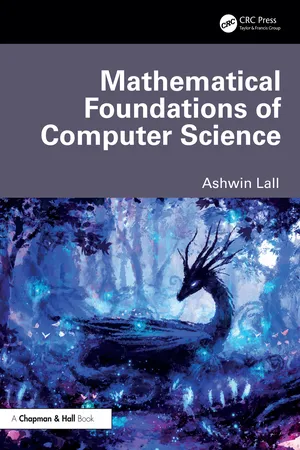
- 236 pages
- English
- ePUB (mobile friendly)
- Available on iOS & Android
Mathematical Foundations of Computer Science
About this book
Mathematical Foundations of Computer Science introduces students to the discrete mathematics needed later in their Computer Science coursework with theory of computation topics interleaved throughout. Students learn about mathematical concepts just in time to apply them to theory of computation ideas. For instance, sets motivate the study of finite automata, direct proof is practised using closure properties, induction is used to prove the language of an automaton, and contradiction is used to apply the pumping lemma.
The main content of the book starts with primitive data types such as sets and strings and ends with showing the undecidability of the halting problem. There are also appendix chapters on combinatorics, probability, elementary number theory, asymptotic notation, graphs, loop invariants, and recurrences. The content is laid out concisely with a heavy reliance on worked examples, of which there are over 250 in the book. Each chapter has exercises, totalling 550.
This class-tested textbook is targeted to intermediate Computer Science majors, and it is primarily intended for a discrete math / proofs course in a Computer Science major. It is also suitable for introductory theory of computation courses.
The authors hope this book breeds curiosity into the subject and is designed to satisfy this to some extent by reading this book. The book will prepare readers for deeper study of game theory applications in many fields of study.
Trusted by 375,005 students
Access to over 1 million titles for a fair monthly price.
Study more efficiently using our study tools.
Information
Table of contents
- Cover Page
- Half-Title Page
- Title Page
- Copyright Page
- Contents
- Preface
- Chapter 1 Mathematical Data Types
- Chapter 2 Deterministic Finite Automata
- Chapter 3 Logic
- Chapter 4 Nondeterministic Finite Automata
- Chapter 5 Regular Expressions
- Chapter 6 Equivalence of Regular Languages and Regular Expressions
- Chapter 7 Direct Proof and Closure Properties
- Chapter 8 Induction
- Chapter 9 Proving the Language of a DFA
- Chapter 10 Proof by Contradiction
- Chapter 11 Pumping Lemma for Regular Languages
- Chapter 12 Context-Free Grammars
- Chapter 13 Turing Machines
- Chapter 14 Computability
- A Counting
- B Probability
- C Elementary Number Theory
- D Asymptotic Notation
- E Graphs
- F Loop Invariants
- G Recurrence Relations
- Further Reading
- Bibliography
- Index
Frequently asked questions
- Essential is ideal for learners and professionals who enjoy exploring a wide range of subjects. Access the Essential Library with 800,000+ trusted titles and best-sellers across business, personal growth, and the humanities. Includes unlimited reading time and Standard Read Aloud voice.
- Complete: Perfect for advanced learners and researchers needing full, unrestricted access. Unlock 1.4M+ books across hundreds of subjects, including academic and specialized titles. The Complete Plan also includes advanced features like Premium Read Aloud and Research Assistant.
Please note we cannot support devices running on iOS 13 and Android 7 or earlier. Learn more about using the app